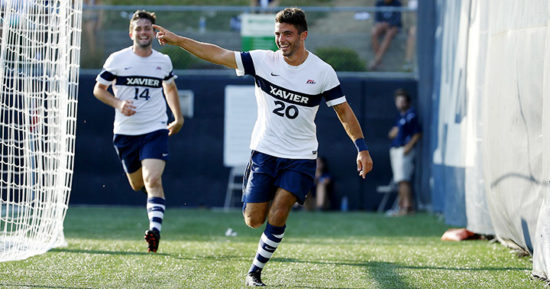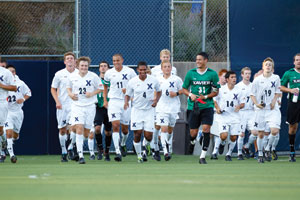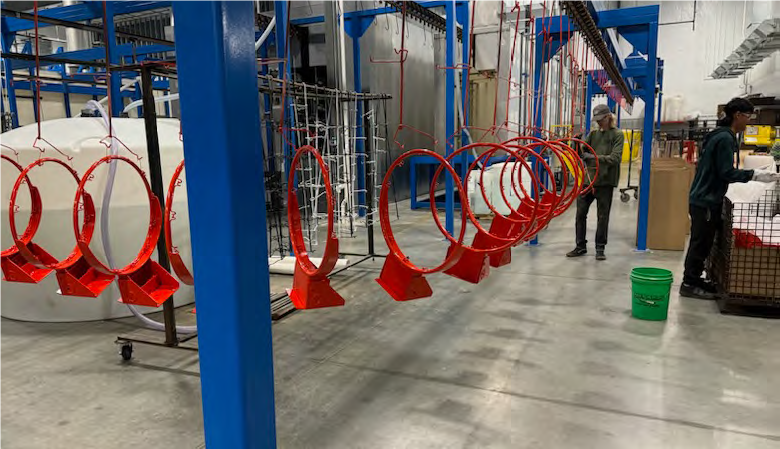Reversing course: The story of the 2010 Xavier soccer team
A blueprint for how head coach Andy Fleming turned around a struggling program

The Xavier Musketeers men’s soccer team took the field in the fall of 2010 as a squad that had won just five combined games in 2008 and 2009. The Musketeers led the Atlantic 10 Conference in 2009 in most yellow and red cards assessed, while only rostering three players with a grade point average of 3.0 or higher.
By the end of the 2010 season, however, the Musketeers were Atlantic 10 Tournament champions for the first time in school history after knocking off the conference’s top three seeds, had amassed 10 wins during the season and featured 17 players with GPAs of 3.0 or higher.
Xavier followed a detailed blueprint developed by head coach Andy Fleming, who said the ideals he installed in the soccer program are applicable to high school and college teams across all sports.Amazingly, the 2010 season was Fleming’s first as a head coach. The Cincinnati, Ohio, program hired him from Northwestern University, where he served as the associate head coach from 2007-09 (he was an assistant at Boston University from 1998-2006).
Fleming spoke candidly with the players from the outset about believing in themselves, working to improve self-image, focusing on the process and developing a challenging, enjoyable and dynamic training environment. He also installed an entirely new blueprint for success with his team, which he constantly described as the “New Xavier” vs. the “Old Xavier.”
Old Xavier
Fleming says the “Old Xavier” was a group of people with no team structure, no program, no identity, no goals, no rules and no spirit. The team’s ideas of building a winning program came from recruiting highly touted prospects who they typically could not sign or bringing in talented players with questionable backgrounds and work ethics.
“Xavier simply wasn’t relevant on the soccer scene. They were known for underachieving and red cards, that’s about it,” Fleming frankly says.
They also were known for losing on the road. In the previous five years before the hiring of Fleming, Xavier posted a pathetic 3-36-3 record away from home. Fleming says the players complained about boring trips, poor diet and the lack of
preparation.
Fleming adds that this mentality came from the top and started in practice. “At my first practice, I had it scheduled for 10 a.m. Only two players were on the field at 9:58.
The rest of them came out late and were not even wearing the same uniforms,” Fleming describes.

“These players didn’t know how to prepare or train properly. They had zero structure. We had to start from the ground and build up.”
It was at this point where Fleming greeted players with his mantra of “Welcome to the South Pole, where every destination from here is upward and pointing north.” He says he started all of his early practices with this phrase to engrain in the players’ mindset that the “Old Xavier” was no more.
The blueprint
Knowing the long road ahead of him, Fleming put together an extensive blueprint to attempt to cure the ailments of the program. In addition to harping on the notion of the end of “Old Xavier,” Fleming says he stressed the idea of “family” with his group of players with everyone saying, “Family!” to begin practice.
It’s one thing to simply say the word “family” but it’s another to get players to believe it. Fleming says the first team meeting went a long way in getting his players to buy into what he was offering.
“I told all of them at the first team meeting that I cared about them and explained what I wanted to give to them in terms of growth and success,” Fleming explains. “I demanded eye contact at all times, which several players said they appreciated, then I wrote ‘0-0′ on the board to signify our current record.”
Fleming issued a 40-item questionnaire to the players to get their feedback on every detail of the program.
He wanted to know what they liked and what they thought worked previously, as well as what didn’t.
“This gave me more insight and gave them some ownership and a voice,” he says. “It also opened their eyes to how many layers and elements go into shaping a program.”
Initially, Fleming says he listened and learned from players while engaging them. It was at that point he could demand things from them.
“They don’t care how much I know until first they know how much I care,” he says.
Fleming also says he didn’t clean house despite taking over an undisciplined group of athletes. He knew it wasn’t completely the players’ fault for the program’s struggles. He offered every player a clean slate and congratulated those who stuck with the program. “We had nine seniors on the team. I needed to meet them halfway. I knew I could shape them a bit but it was too late to change them,” Fleming says. “I told them my goal was to give them an enjoyable senior experience (record aside) and have them walk into the sun with their chins up, having left the groundwork for future success.”
The final part of the blueprint took the form of a bus. After the first week of being on the job, Fleming brought in a picture of a bus to show his players. He told them he’s driving the bus and for them to look at the bus for a couple of days, then it will start to move slowly.
“I informed them that some players will get right on the bus, others should be pulled onto it, some will be denied entrance and some will watch it go right by them.
“I told them not to worry about the map or destination of the bus until later. We spoke about the bus daily and players started to make sense of it, even referring to it when they were speaking.”
Winter advancements
Fleming’s blueprint and plans for the team started to take shape in the winter of 2009 after he was hired. Despite it being a long “bus trip” to the team’s official season in the fall of 2010, Fleming set several attainable goals to build togetherness and a sense of camaraderie.
The team had a mandatory Super Bowl party, which Fleming paid for out of his pocket, so players could spend time together off the field.
The squad also had a team dinner and attended a basketball game together. “In this setting I could tell which players liked being around the team and who had no desire to be there,” Fleming remarks.
Also occurring in the winter was the athletic department’s raffle ticket drive. This contest featured all of the athletic teams at Xavier competing to sell the most raffle tickets. In the past, the track or swimming teams typically won due to the sheer volume of athletes in their respective programs.
“I demanded we win this ticket drive. Soccer had never won it and this would be our first victory in anything in my era,” Fleming says.
“I told them winners win in everything. Plus, by selling more, we would earn more fundraising money and a bonus to our budget.”
By spring, the soccer team had won the ticket drive. The athletic director came to practice to present the check and Fleming was recognized at a department-wide meeting.
During the winter, Fleming established his rules, including all players being on the field 15 minutes before practice begins as well as being in the locker room 30 minutes prior to the start of practice. At practice, players are required to touch the line of every sprint, go around all cones on fitness drills, have their shirts tucked into their jerseys and carry the equipment (not just freshman).
Fleming instituted a black-cleat only policy to deflect attention away from individuals. Previous Xavier soccer teams featured players wearing different colored shoes and sporting mohawk haircuts.
At the same time, Fleming established an eight-man leadership committee of influential players consisting of some seniors and some athletes who might ascend to the role of captain someday. This committee acts as a bridge between the team and the coach on messages to
- All players stand up and embrace the player coming off the field during a substitution.
- All players on the field make contact with each other after scoring a goal.
- Team comes and goes to the locker room as a unit before the game and during halftime.
The team went 2-1-2 in those five spring games and recorded two shutouts. The only loss came in the final game with five seconds to go.
“We used this loss as an offseason motivator and a reminder that we must continue to learn how to finish games for the fall,” Fleming says. “We put together a very safe spring schedule to assure success and learned how vital scheduling can be.”
Executing the plan
 By the fall, Fleming’s plan and Xavier’s team had its share of ups and downs. On the “up” side was having players buy into the fall season motto of “catching the butterfly,” which meant qualifying for the Atlantic 10 playoffs. The team talked about keeping the butterfly in the locker room where it could be seen, not letting it get out the door, then actually catching it down the stretch as the team got closer to its goals.
By the fall, Fleming’s plan and Xavier’s team had its share of ups and downs. On the “up” side was having players buy into the fall season motto of “catching the butterfly,” which meant qualifying for the Atlantic 10 playoffs. The team talked about keeping the butterfly in the locker room where it could be seen, not letting it get out the door, then actually catching it down the stretch as the team got closer to its goals.
“Gimmicks, themes and finding ways to measure where you are often work with younger and rebuilding programs,” Fleming remarks. He also adds that breaking your schedule into manageable pieces works wonders with younger teams. Instead of looking at a daunting task of a 20-game season, break the schedule into fouror five-game series so it appears less overwhelming. “This presents more opportunities for small victories during the course of a long season,” Fleming remarks.
On the “down” side came having eight players, including seven seniors, not pass the fitness test. “This shows you could shape the seniors but not change them,” he says. “The younger players were more mature and formed our core. We created roles for the seniors and had them rotate as being assistant captains for games to keep them engaged at the start of the season.”
The biggest “up” might have come in the team’s first exhibition against the aforementioned Indiana team. Xavier won and the team looked on its way to a remarkable season. Then, as quickly as the positive momentum started, it turned again.
Xavier lost eight starters in the next 12 days due to injury and limped out of the gates to a 1-2-3 regularseason record (and only one goal scored) after six games.
Despite the downturn, Fleming focused on the positives. “We had only allowed two goals and were ranked nationally in team defense,” he says. “I reminded players to focus on attitude, the process and winning halves. I also reminded them that while other teams would lose players as the season wore on, we’d be getting our players back.”
Fleming also kept the positive energy flowing by showing the players examples of previous teams that had started slow but finished strong, including his own Boston University team that started 0-5 in 2004 but made the NCAA tournament. “I didn’t berate or punish them but we continued to push them. I reminded them I was proud to be their coach and that I cared about them,” he says.
As the players slowly returned from injury, the Musketeers saw improvement on the field, including a five-game unbeaten streak and an additional three-game winning streak to move the team into a tie for the conference lead with five games to go. Then, the wheels came off.
The energy it took going from an afterthought to a conference leader wore on the players. Plus, their mindset changed once they saw their team name at the top of the standings. Instead of pushing harder, they backed off and lost three of four.
Xavier won its conference finale at Fordham with several seniors playing their best game of the season, but it appeared not to be enough as the team awaited word on three other results to determine who qualified for the conference tourney.
At LaGuardia Airport in New York on the way home from Fordham, the team learned it has qualified for the Atlantic 10 playoffs. “We had players running up and down the sidewalks screaming like we had just qualified for the NCAA tournament, “Fleming says.
“Keeping our seniors and core players engaged during our toughest stretches, as well as bringing daily energy and using perspective and gimmicks to motivate them allowed us to stay the course and qualify for the playoffs.”
Postseason gains
At this point, Xavier was playing with “house money” so to speak. As the No. 6 (and final) seed in the conference tournament, the Musketeers needed to win three games against favored opponents to claim the squad’s first conference crown.
Fleming posted signs in Xavier’s locker room reading “0-0,” “No One Wants To Play Us,” and “Survive And Advance” for when players showed up for their first postseason practice. He came into the locker room with handfuls of Monopoly money, threw it in the air and said, “This is someone else’s money, house money.
You can spend it all in five minutes or enjoy some of it and invest the rest, which you’ll really enjoy.”
He also hung a picture of a butterfly in the locker room and challenged the players to catch it again.
After the intensity of the season, Fleming opted to go with a more loose mentality in the playoffs with his squad being the big-time underdog. The team told jokes during their pre-game meals and watched clips from their favorite movies leading up to game time.
The season-long and immediate strategies paid off with Xavier posting three shutouts while knocking off the No. 3, then No. 1 and finally the No. 2 team in the Atlantic 10 to claim the conference crown. And while the Musketeers’ season finally came to an end with a 4-2 loss to West Virginia in the first round of the NCAA tournament, Xavier’s season proved to be a success beyond anyone’s wildest calculations.
With the foundation now in place, it’s clear this program is en route to success for years to come … and it’s all due to having a comprehensive, detailed blueprint in place for the moment Fleming took over this squad.





